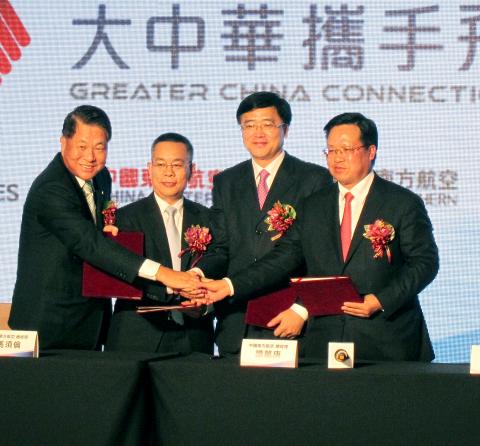China Airlines Ltd (CAL, 中華航空), the nation’s largest carrier, maintained an upbeat outlook on its sales and profitability this year on the back of a mild global economic recovery and strong demand on regional routes in Asia, a company official said yesterday.
“We hold a relatively optimistic view for the year of 2013 amid a U-shaped mild-paced economic recovery,” CAL president Sun Hung-hsiang (孫洪祥) told reporters yesterday following the signing ceremony for a deal under which CAL is forming an alliance with three Chinese carriers
Sun said he expected the company’s passenger business to stay strong this year, with regional routes in Asia major drivers.

Photo: Wang Yi-hung, Taipei Times
Meanwhile, the carrier expects to launch more routes to Japan and China this year to boost sales in the passenger sector, he added.
As for cargo business, Sun said that the sector was bottoming out, an indication that CAL’s cargo business might not fare worse this year than last year.
Global crude oil prices — the major factor affecting a carrier’s operating costs — are also not expected to increase substantially this year, Sun said.
However, Sun said that oil prices may still fluctuate this year, with the situation in the Middle East likely to be a major area of uncertainty.
Following its forming an alliance with China Eastern Airlines Corp (中國東方航空), China Southern Airlines Co (中國南方航空) and Xiamen Airlines (廈門航空), CAL plans to expand its market share for cross-strait routes this year by offering more flights and destinations to China.
The four airlines will be cooperating on code-sharing services, providing more flight choices to passengers, Sun added.
CAL has about 28 percent of market share in cross-strait routes, company data showed.
Sun said the alliance could offer more services in the future, following the platform established by the four airlines maturing.
CAL posted NT$121.26 billion (US$4.17 billion) in sales for the first 11 months of the year, up 0.38 percent from a year earlier, the airline said in its stock exchange filing.
The company’s shares stayed flat at NT$12.1 yesterday, but dropped 9.09 percent for the whole of last year, stock exchange data showed.

Semiconductor business between Taiwan and the US is a “win-win” model for both sides given the high level of complementarity, the government said yesterday responding to tariff threats from US President Donald Trump. Home to the world’s largest contract chipmaker, Taiwan Semiconductor Manufacturing Co (TSMC, 台積電), Taiwan is a key link in the global technology supply chain for companies such as Apple Inc and Nvidia Corp. Trump said on Monday he plans to impose tariffs on imported chips, pharmaceuticals and steel in an effort to get the producers to make them in the US. “Taiwan and the US semiconductor and other technology industries

A start-up in Mexico is trying to help get a handle on one coastal city’s plastic waste problem by converting it into gasoline, diesel and other fuels. With less than 10 percent of the world’s plastics being recycled, Petgas’ idea is that rather than letting discarded plastic become waste, it can become productive again as fuel. Petgas developed a machine in the port city of Boca del Rio that uses pyrolysis, a thermodynamic process that heats plastics in the absence of oxygen, breaking it down to produce gasoline, diesel, kerosene, paraffin and coke. Petgas chief technology officer Carlos Parraguirre Diaz said that in

CHIP WAR: Tariffs on Taiwanese chips would prompt companies to move their factories, but not necessarily to the US, unleashing a ‘global cross-sector tariff war’ US President Donald Trump would “shoot himself in the foot” if he follows through on his recent pledge to impose higher tariffs on Taiwanese and other foreign semiconductors entering the US, analysts said. Trump’s plans to raise tariffs on chips manufactured in Taiwan to as high as 100 percent would backfire, macroeconomist Henry Wu (吳嘉隆) said. He would “shoot himself in the foot,” Wu said on Saturday, as such economic measures would lead Taiwanese chip suppliers to pass on additional costs to their US clients and consumers, and ultimately cause another wave of inflation. Trump has claimed that Taiwan took up to

SUBSIDIES: The nominee for commerce secretary indicated the Trump administration wants to put its stamp on the plan, but not unravel it entirely US President Donald Trump’s pick to lead the agency in charge of a US$52 billion semiconductor subsidy program declined to give it unqualified support, raising questions about the disbursement of funds to companies like Intel Corp and Taiwan Semiconductor Manufacturing Co (台積電). “I can’t say that I can honor something I haven’t read,” Howard Lutnick, Trump’s nominee for commerce secretary, said of the binding CHIPS and Science Act awards in a confirmation hearing on Wednesday. “To the extent monies have been disbursed, I would commit to rigorously enforcing documents that have been signed by those companies to make sure we get